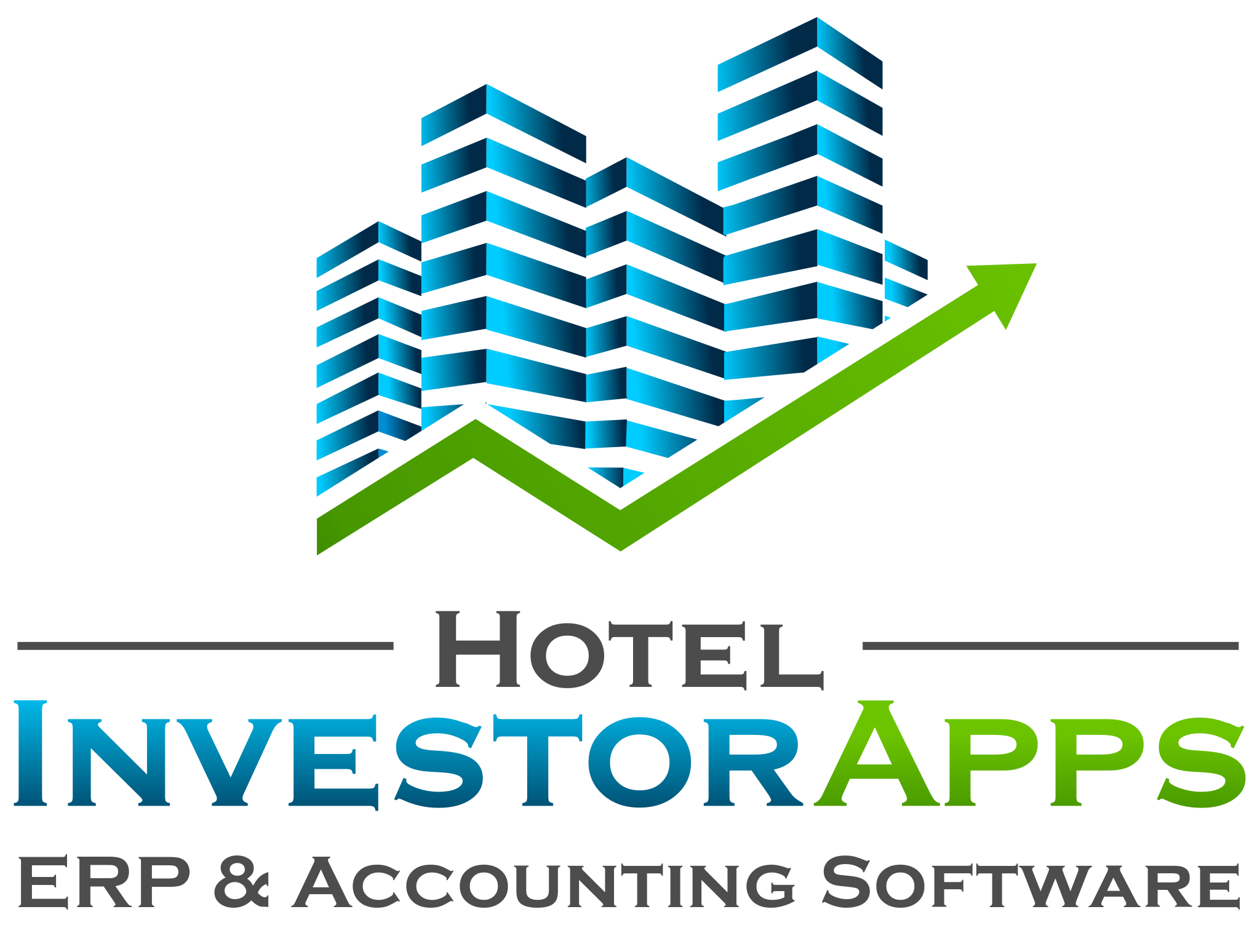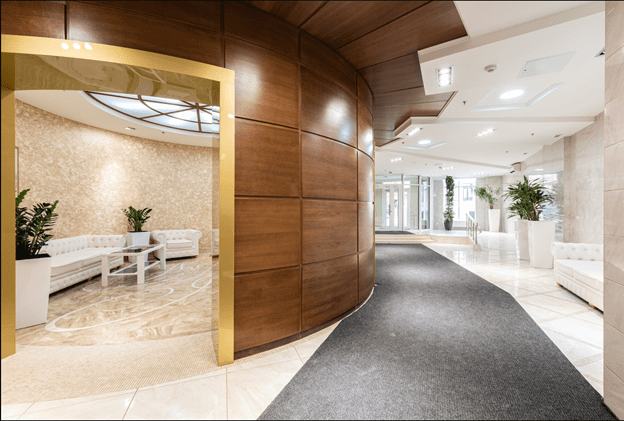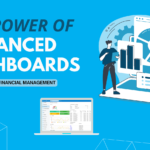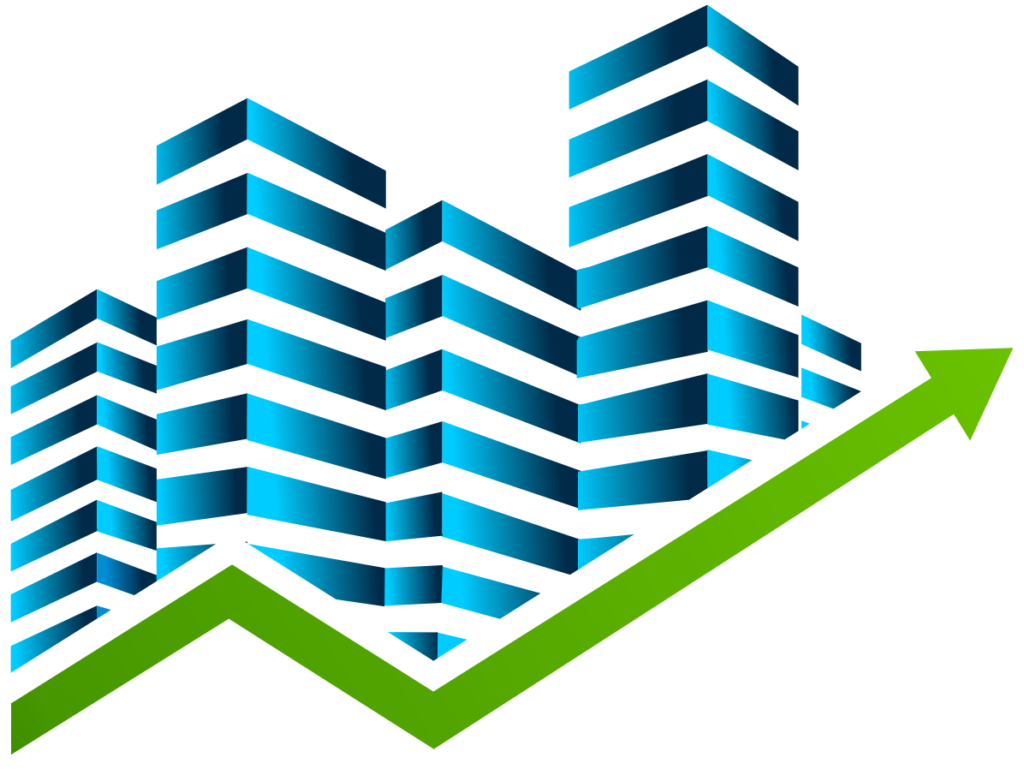Hotels sit on a goldmine of data that underlies every operation, every transaction, and every guest interaction. Making sense of all that data is no longer an option but a necessity to remain competitive in today’s climate.
But spending hours combing through error-prone spreadsheets and reports trying to consolidate information into actionable insights leads to inefficiencies that can hurt your bottom line.
You need a smarter, quicker, and more strategic utilization of this data you already have at your fingertips—that’s where business intelligence (BI) comes into play.
In this article, we’ll explore what BI is for hotels, why it matters, and how to choose the right BI tool for your business.
| Key Takeaways |
|
Business Intelligence for Hotels: The Basics
The hotel industry uses BI to collect, integrate, analyze, and present data collected from front- and back-of-house systems, as well as third-party sources.
This information allows hoteliers to gain insights into business operations and trends, drive profitability, and make strategic decisions based on facts rather than intuition.
To do this, every BI tool uses several core components, such as:
- Data Warehousing: This involves the collection, integration, and storage of data from various sources into a single, accessible repository. It allows hoteliers to consolidate historical and real-time data from different hotel operations and departments for comprehensive analysis.
- Data Mining: This process uses algorithms and statistical techniques to discover patterns, relationships, and insights from large data sets. Hotels can analyze guest booking patterns, personalize marketing campaigns, optimize pricing strategies, and tailor services to specific customer segments.
- Data Visualization: This is where data is represented via charts, graphs, maps, and other visual elements. It simplifies complex data and makes it easier to understand, thereby helping hoteliers quickly grasp insights and make informed decisions.
- Predictive Analytics: This is where the system analyzes past and current data to analyze current and historical facts, predict future events, and provide actionable recommendations. It can help hoteliers forecast demand, optimize pricing, and increase revenue.
BI’s Role in the Hotel Industry
As we continue to pull in data from multiple sources (online bookings, social media chatter, internal systems, etc.), BI tools are quickly becoming a go-to weapon to process and analyze this information.
With increasing competition, changing customer preferences, and fluctuating market trends, hotels need to leverage their data to improve their operations and maximize profits.
These insights then lead to:
Improved Decision Making
Making quick and accurate decisions can be the difference between success and failure. The ability to transform data into practical insights is vital, and that’s precisely where BI tools come in.
By collating and analyzing vast amounts of data, these tools provide a comprehensive picture of a hotel’s operations, customer preferences, and market trends.
Whether it’s identifying patterns in booking habits, predicting peak seasons based on historical trends, or determining the most popular room types or amenities, BI tools offer real-time, actionable insights that can drive strategic decision-making.
On top of that, BI tools’ predictive capabilities allow hotels to anticipate future needs, optimizing rates, staff, and promotions proactively. This means hotels can respond quickly to changing market conditions and customer preferences, providing them with a competitive edge.
Increased Operational Efficiency
Hotels are complex operations, often with multiple departments working in tandem to provide the best possible service to guests. However, inefficiencies can creep in and erode margins if not managed effectively.
BI for hotels can significantly enhance operational efficiency by providing valuable insights, automating workflows, and streamlining processes, such as staff scheduling, energy utilization, and inventory management.
By flagging areas of concern and suggesting solutions, BI can assist hotels in streamlining their operations, cutting costs, and boosting profitability.
The ability to track key performance indicators (KPIs) in real-time also allows for swift remedial action when necessary, reducing the likelihood of persistent operational issues that can harm the hotel’s bottom line.
Strengthened Financial Management
Through in-depth data analysis and predictive capabilities, BI tools can help hoteliers get a comprehensive view of a hotel’s financial performance, including revenue trends, cost structures, and profitability across different services and departments.
Hoteliers can monitor these metrics over time, identify patterns, and gain insights into the factors influencing their financial outcomes.
These tools play a significant role in detecting potential revenue leakages, such as underutilized services or inefficient operations, giving hoteliers a chance to fix these issues right away.
They also empower hoteliers with the capability to track budget adherence in real-time, pinpoint any discrepancies, and facilitate necessary adjustments.
Enhanced Customer Satisfaction
Understanding customer needs and preferences is essential in almost every industry, and BI tools are an invaluable asset in helping you do this.
By analyzing customer data from various sources like booking platforms, customer reviews, and social media, BI can provide deep insights into customer behavior, preferences, and satisfaction levels.
Hoteliers can utilize BI tools to personalize marketing campaigns, optimize pricing strategies, and customize services.
BI tools can also help hotels anticipate guest needs and preferences. In some cases, they can forecast future demand by analyzing historical data and occupancy trends and then adjust their inventory and staffing accordingly.
Thus, hotels can provide better service to their guests, reduce wait times, and avoid overbooking or underbooking.
How to Implement BI In Your Hotel
Now that you know how BI for hotels works, it’s time to implement it. Follow these five steps to start using BI in your hospitality business.
- Identify Your Needs and Set Clear Goals: Before implementing BI into hotels, you need to determine your specific needs and goals. Determine the key areas where you want to gain insights and improve operational efficiency, as it will guide implementation.
- Choose the Right BI Tools: Research and evaluate different BI solutions based on their capabilities, scalability, ease of use, and compatibility with your existing systems. Consider data visualization, reporting capabilities, data integration options, and analytics features to ensure they align with your needs.
- Collect and Integrate Data: Establish a data collection plan that encompasses the relevant data sources within your hotel, such as property management systems (PMS), point-of-sale (POS) systems, customer relationship management (CRM) software, and online booking platforms. Ensure data integration between these systems and the chosen BI tool to consolidate and harmonize the data for analysis.
- Train Your Staff: Provide comprehensive training for staff members working with the BI tools. Familiarize them with the selected BI software’s functionalities, features, and workflows.
Top 3 BI Tools
While there are plenty of tools available on the market, only a few are designed specifically for the hotel industry. Here are our top three best BI tools to consider:
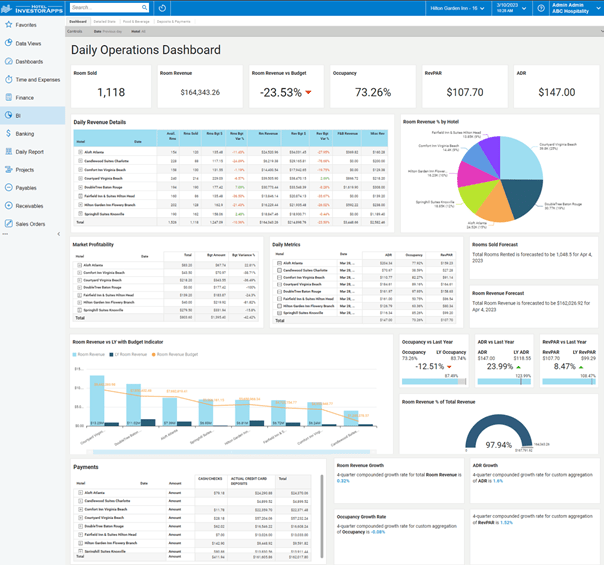
HIA’s comprehensive BI platform expertly combines data from financial, operational, and labor segments, presenting critical, user-friendly metrics to hoteliers, leading to better performance and enhanced profitability.
Leveraging the power of AI and machine learning, the platform boasts customizable dashboards that facilitate rapid trend recognition, detailed data scrutiny, and informed decision-making.
With its robust analytical capabilities, the platform serves as an effective tool for managing expenses, predicting trends, and boosting operational efficiency.
2. M3 Insight
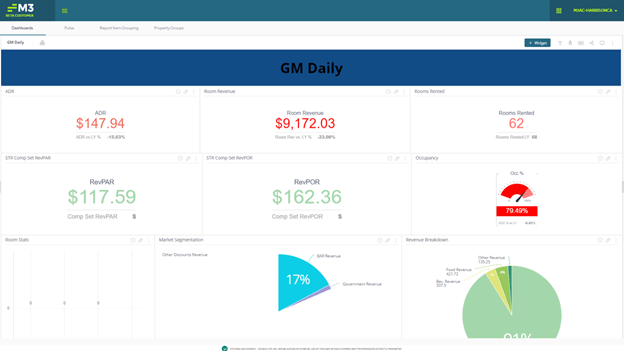
M3 Insight enables hotel managers to gain quick insights from hotel-specific data by utilizing a self-service, hotel-specific BI tool.
Hoteliers can improve revenue, profitability, and efficiency with this platform’s real-time analysis, visualization, and reporting capabilities.
3. Hello GM
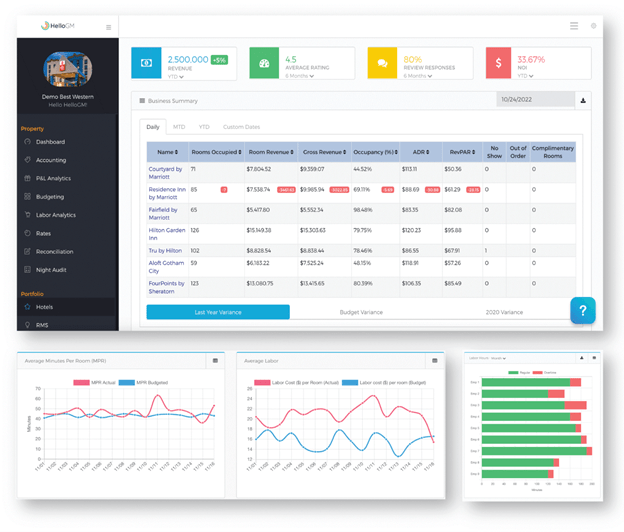
This BI tool offers intuitive dashboards and powerful analytics to help you visualize your entire financial management data with Hello GM.
With its intuitive design, even non-technical users can quickly get up to speed and fully use the product.
Closing Thoughts
Having explored BI for hotels, it’s clear to see that the necessity of implementing these powerful tools has moved from a ‘nice to have’ to a ‘must-have’.
They’re not just tools, they’re partners in your success. If you still have any lingering questions about BI or what it can do for your hotels, please reach out and speak with a member of our team.
We’d be happy to show you all the ways BI can help you make better, more informed decisions.

Jaime Goss has over a decade of marketing experience in the hospitality industry. At Hotel Investor Apps, Jaime heads up marketing initiatives including brand strategy, website design, content, email marketing, advertising and press relations.
